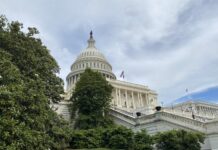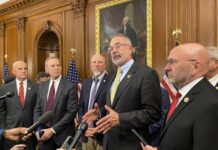
(GA Recorder) — The COVID-19 pandemic pitted parents against school boards. A high-profile murder trial played out in coastal Georgia, roiling racial tensions. And embittered fights over an overhaul of the state’s voting law were spurred by baseless claims of widespread fraud in the 2020 presidential election.
Before we turn the calendar to 2022 when election-year shenanigans are sure to take flight, here is a recap of milestones from 2021 that will long be etched in the memories of millions.
COVID-19 pandemic, vaccine mandates stir outrage
The COVID-19 virus often dictated the news in 2021, touching Georgians in many ways. Expanded vaccine availability and testing in the spring hinted at a return to normal only for that illusion to be yanked away by the delta and omicron variants.

In the first months of the year, all adults were eligible to receive the miraculous new vaccines and more people returned to their normal routines. The vaccines drastically lowered the likelihood of the virus spreading and the chances of becoming seriously ill if infected.
Even so, with many Georgians either refusing the vaccines or hesitant to get a shot, hospitals became overcrowded with unvaccinated patients taking up beds as new coronavirus variations spread.
Meanwhile, Georgia’s colleges and universities and many public school systems grappled with mask policies, employee vaccination requirements, and setting standards for students’ and staff’s vaccination status.
Georgia’s Republican governor and attorney general have also taken legal action to fight the Biden administration’s vaccine mandates for federal contractors and health care workers.
Ahmaud Arbery’s killers found guilty
A nearly all-white Glynn County jury in November issued a guilty verdict against the three white men on trial for the February 2020 shooting death of Ahmaud Arbery, who was Black, as he jogged through their Brunswick-area neighborhood.

Gregory and Travis McMichael, along with their neighbor William “Roddie” Bryan, are expected to find out on Jan. 7 whether the mandatory life sentences they’re about to serve for the murder of the 25-year-old will come with consideration of parole.
The convictions mark the culmination of 18 months of Arbery family pressure to deliver justice. Arbery’s killers were spared arrest for weeks after police responded to the bloody street shooting in the Satilla Shores neighborhood.
The racial makeup of the jury and the law enforcement background of one of the defendants raised questions about whether the three white men could be convicted in the deep South.
Months before the trial began, Georgia lawmakers mostly repealed the citizen’s arrest law that local prosecutors initially used to justify Arbery’s death. His murder also galvanized support for a state hate crimes law in 2020.
In a federal trial scheduled for Feb. 7, the heavily resourced U.S. Department of Justice’s arguments will boil down to whether Arbery was targeted because he was Black.
Georgia’s historic U.S. Senate runoffs
Democrats Jon Ossoff and Rev. Raphael Warnock became Georgia’s newest U.S. senators and flipped control of the federal government in historic Jan. 5 runoffs against incumbent GOP Sens. David Perdue and Kelly Loeffler.
The high-stakes battles broke congressional election records with more than $700 million in total campaign spending. The races captured the nation’s attention while then-President Donald Trump and his most ardent supporters pushed unfounded narratives of a stolen presidential election, likely driving away GOP voters from the polls in January.

Georgia’s new senators arrived in Washington D.C. as the Senate prepared to begin the second round of impeachment hearings over charges that Trump incited a deadly U.S. Capitol riot on Jan. 6.
The Ossoff and Warnock victories gave Democrats a narrow voting edge in the Senate and helped President Joe Biden score a win with a large-scale infrastructure package.
Warnock is back on the campaign trail with a November election a year after he filled the unexpired term of Sen. Johnny Isakson, who stepped down in 2019 due to health complications. Isakson died in December.
Georgia’s controversial election law
When Georgia Republicans ushered through the controversial voting overhaul Senate Bill 202 in March, it triggered a wave of lawsuits, including from the U.S. Department of Justice alleging the law disenfranchises Black people and other marginalized groups.
Republicans have been criticized by more than two dozen voting rights groups for adding provisions that limit the number of absentee drop boxes, shorten the period for requesting absentee ballots, add new absentee ID requirements, allow the state to take over local election boards, and other restrictions.

Democrats and voting rights advocates railed against the law as an unreasonable response to unfounded claims of widespread voter fraud in the 2020 election after Trump’s embarrassing presidential election loss and Democrats seized two seats in the U.S. Senate.
Republicans state officials argue that reshaping voting laws and election laws is important to restoring trust in an election system Trump repeatedly said was rigged and have called critics’ claims of discrimination overblown.
The Black vote became a key factor in determining election outcomes after a record 5 million Georgians voted in the Nov. 3 general election, including 1.3 million via absentee ballots.
The new law had its first test run with municipal elections in November before a busy election cycle in 2022 headlined by races for governor, secretary of state and U.S. Senate.
Even though the Heritage Foundation gave Georgia’s new voting law its stamp of approval, the fallout among GOP members continues to factor in the upcoming primaries with former U.S. Sen. David Perdue, at Trump’s urging, taking on Gov. Brian Kemp in the Republican primary.
And waiting in the wings for the winner of what’s sure to be a brutal GOP fight is Democrat Stacey Abrams, who as expected announced she will carry her party’s standard after narrowly losing to Kemp in 2018.
Rivian’s $5 billion electric vehicle manufacturing investment
At the risk of recency bias, one of the biggest economic development announcements ever in Georgia is a late entry to 2021’s most notable milestones.

East Georgia is set to become home to an electric vehicle plant that is part of a $5 billion investment projected to create 7,500 jobs over several years after its projected ribbon-cutting in about two years.
The governor and other state officials call Rivian’s car manufacturing facility one of the largest single private investments in the state’s history. The plant will be built on 2,000 acres straddling Morgan and Walton counties and is expected to produce 400,000 clean-energy vehicles a year.
Georgia’s yet-to-be-disclosed tax incentive package was attractive enough to score a win over Fort Worth, Texas, which offered $440 million in tax breaks to the start-up company.
In a year marred by COVID spikes, hyper-partisan sniping and fights over basic tenets of democracy, December’s news about a new car plant put a needed bow on an unprecedented year.







